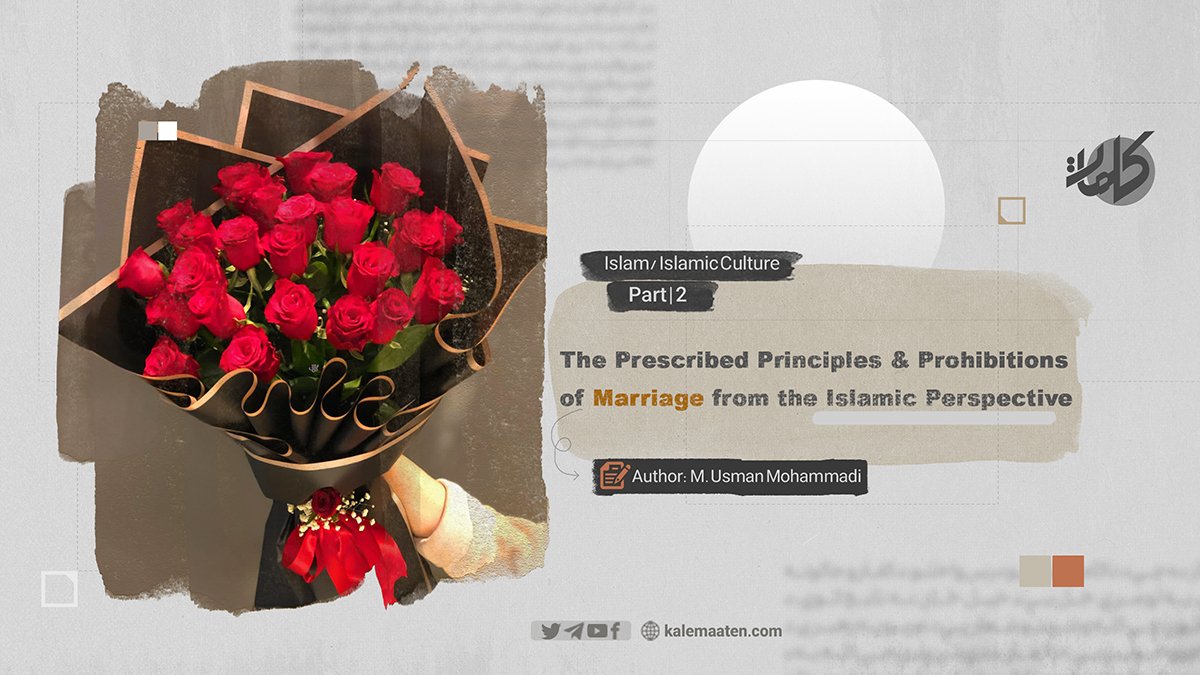
Author: M. Usman Mohammadi
The Prescribed Principles and Prohibitions of Marriage from the Islamic Perspective (Part Two)
The Legitimacy of Khitbah (Marriage proposal) in Islam:
The Reasons for the Legitimacy of Khitbah:
From ancient times, it has been customary that before marriage, a person or a group from the groom’s family would visit the bride’s family to propose marriage. This tradition has also been endorsed by the sacred religion of Islam. As such, Allah the Almighty has referred to the Khitbah of a woman during her waiting period (ʿiddah) in the Holy Qur’an. Moreover, the Prophet of Islam (peace be upon him), in order to preserve the dignity and character of both the man and the woman intending to marry, has considered Khitbah—being the first step towards engagement—a legitimate and valid preliminary stage to marriage.
The primary proof for the legitimacy of Khitbah is verse 235 of Surah Al-Baqarah, in which Allah the Almighty defines the proper way to court a woman in her waiting period: “وَلَا جُنَاحَ عَلَیكُمْ فِیمَا عَرَّضْتُمْ بِهِ مِنْ خِطْبَةِ النِّسَاءِ” Translation: There is no blame upon you for indirectly proposing marriage to [such] women.
Another evidence for the legitimacy of Khitbah is the practice of the Prophet Muhammad (peace be upon him). He proposed marriage to Ayesha (may Allah be pleased with her) and Hafsah (may Allah be pleased with her). According to a narration from ʿUrwah: “The Prophet (peace be upon him) proposed to Ayesha from her father, Abu Bakr. Abu Bakr said: ‘Indeed, I am your brother.’ The Prophet replied: ‘You are my brother in the religion of Allah and His Book, and she (Ayesha) is lawful for me to marry.’” — [Sahih al-Bukhari, 5081]
Regarding the proposal to Ḥafṣah, her father ʿUmar ibn al-Khattab said: “The Prophet (peace be upon him) proposed to Ḥafṣah, and I gave her in marriage to him.” — [Sahih al-Bukhari, 4830]
In another hadith, the Messenger of Allah (peace be upon him) said: “If one of you wishes to propose to a woman, there is no harm in looking at her, provided the intention is for marriage—even if she is unaware.” — [Musnad Ahmad, 23602] From all this evidence, the legitimacy of marriage proposal in Islam is firmly established.
It is important to note that a marriage proposal can come from either the man or the woman, and there is nothing wrong with that. Those who consider it shameful or inappropriate for the woman’s family to initiate a proposal are contradicting both Islamic law and established custom. Throughout Islamic history and among the companions of the Prophet (peace be upon him), there are examples of individuals proposing marriage on behalf of their daughters. In some cases, women themselves approached the Prophet and said, “O Messenger of Allah, marry me.”
Thus, although in many cultures it is customary for the man to propose marriage, which is a form of honoring the woman, if a woman proposes to a man, there is no blame or shame in it, and no one should mock or criticize her for it.
Conditions of Khitbah (Marriage proposal):
Generally, scholars mention two main conditions for Khitbah. Since Khitbah is a means to marriage, any marriage that is prohibited in Islamic law automatically makes its Khitbah impermissible. Similarly, if a marriage is permitted, its Khitbah is also legitimate. If a temporary religious obstacle exists, then Khitbah too is prohibited. Therefore, Khitbah in Islam is subject to the following two conditions:
First Condition:
The woman being proposed must be free from any legal impediments that currently prohibit marriage. This means the man must be religiously allowed to marry her. For example, she must not be among his permanently or temporarily prohibited (maḥram) women. Since marriage with such women is not allowed, courting them is likewise impermissible.
Second Condition:
The woman must not already be engaged to another man. If a righteous man with good Islamic character has proposed to a woman, and she has responded positively, and a connection has been established between them, it is not permissible for another man to propose to her. In such a case, the first man gains a legitimate right, and in order to preserve Islamic brotherhood and avoid unethical behavior, others must respect that. Competing proposals in such a scenario resemble betrayal or theft.
However, if the first suitor withdraws or gives explicit permission, it is then allowed for another man to propose to the woman. As mentioned in the hadith, the Prophet Muhammad (peace be upon him) said: “A believer is the brother of another believer. Therefore, it is not permissible for a believer to outbid his brother in a sale, nor to propose marriage over the proposal of his brother—unless the first one withdraws.” [Sahih Muslim, 3529]
Continues…


